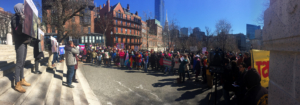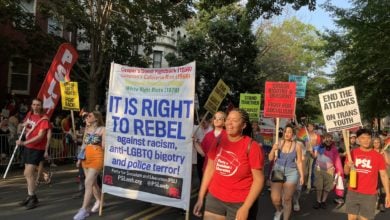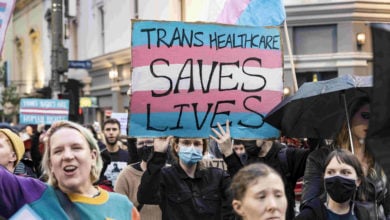 On March 4, hundreds of people gathered at the Boston commons in defense of trans youth and trans rights. The rally was called by the Mass Trans Political Coalition in response to a federal roll back on guidance protecting trans youth. A statement from the MTPC stated, “This rally is about coming together to demand the rights and autonomy of trans people, more specifically trans and gender nonconforming youth of color, in our schools, in our public spaces, and in our world.”
On March 4, hundreds of people gathered at the Boston commons in defense of trans youth and trans rights. The rally was called by the Mass Trans Political Coalition in response to a federal roll back on guidance protecting trans youth. A statement from the MTPC stated, “This rally is about coming together to demand the rights and autonomy of trans people, more specifically trans and gender nonconforming youth of color, in our schools, in our public spaces, and in our world.”
The crowd gathered at noon on Boston Commons by the Massachusetts State House, as organizers led chants. An American Sign L interpreter stood on the steps with the speakers, who addressed the crowd and called for a moment of silence for the eight trans people of color murdered so far this year — Ciara McElveen, JoJo Striker, Mesha Caldwell, Keke Collier, Jaquarrius Holland, Chyna Gibson, Jamie Lee Wounded Arrow, and Demarkis Stanberry. Protesters holding large signs with the fallen peoples’ names and pictures stood behind the speakers.
Charles Meins, a trans gay man and organizer with the Greater Boston PFLAG, spoke before the rally, saying: “Let us pee! We got to go! If you hold it in that’s liver damage. We face enough health risks as trans folks already! We should not need to hurt ourselves for someone else’s comfort.”
Another speaker continued, “It was never about bathrooms. Just like it was never about water fountains…. it’s about human rights.”
The protesters took the streets, marching from the Boston Commons to Post Office Square, holding signs reading “Trans rights are human rights,” “Down with the cis-tem” and “Black trans lives matter,” while chanting “No collaboration with this administration,” “Non-binary is beautiful-fabulous as usual,” and “Trans liberation, not assimilation.”
Upon arriving at Post Office Square, trans youth and students were encouraged to take the mic and speak. Charlotte Adams, a local high school student, spoke about challenges trans students face in schools. “The sign I brought today… says ‘Trans people deserve respect.’ This sign means so much more to me than just those words. A couple months ago I tried to put a sign up at my school that said ‘Trans people deserve respect’ and it got ripped down multiple times by students. When I told the administration, they told me they were the ones who ripped it down the third time.” The crowd booed.
Adams continued, “They told me it was not inclusive enough. I told them that when you are the oppressor, equality feels like oppression. I tried to tell them that this sign makes trans people happy, but they said that two students felt threatened by it…. It was a lot of fights, I talked to my dean, and then eventually they told me to talk to the principal, and it ended with not having that sign up…. and I just really wanted to thank you guys for coming out here for me, because I have so many trans friends and after the election we felt so scared…” The student began to tear up before finishing, “…and to see all these people out here to fight for me and my right to pee – which is something I shouldn’t have to say.”
Despite the cold, the crowd of protesters was loud and energetic, interjecting chants, cheers, and other affirmations into the speeches. When another high school student took the mic and began, “My name is Andy – that’s the first time I’ve said that out loud,” the crowd began chanting “Andy! Andy! Andy!” before the youth said their school now has four gender neutral bathrooms, and is changing the graduation gowns to be all one color.
Michelle Tat, an organizer with MTPC and Black and Pink, was the last speaker. She told the crowd, “To all the youth out there, I didn’t know I was going to be an activist two years ago. Who would have known? And what I want to tell you is that you can be an activist as well. You can advocate for you, and you can organize at your schools, and it’s so important that we continue doing that. If some 31-year-old trans woman cat lady can do it in a couple years, you can do it too!” The crowd laughed, before she continued, “We also must remember that we stand together with other marginalized communities. Because Black Trans Lives Matter. Because Black Lives Matter. Because Muslim Lives Matter. Because Latinx Lives Matter. Because Immigrant Lives Matter. And not only do I expect to see you at the next trans rally, I also expect to see you at the next immigrant rights rally. At the next Black Lives Matter rally. We must all stand together as a community.”
Sasha Costanza-Chock, a professor at the Massachusetts Institute of Technology and member of the Transformative Media Organizing Project, came to the march armed with a bongo drum, and led the protestors in Assata Shakur’s “Nothing to Lose But Our Chains” chant to close the demonstration. In an interview after the march, they told Liberation News:
“What I think is so powerful about this moment, is that we’re in what Cosecha Movement calls ‘a moment of the whirlwind’… a moment of great political possibility, when the horizons of what you previously thought was the limit of the types of actions that people would take, or the ability to mobilize people, suddenly shift… part of that is because the incredible visibility and the naked face and fangs of white supremacy, hetero-patriarchy, and settler-colonialism, and capitalism, have come out bare knuckled with this incoming administration. Not that they weren’t there already, but many more people are able to see it, and see how intense the moment is.
She continued, “And so in a matter of days you can organize hundreds and sometimes even thousands of people to come out and mobilize. So now we’re in this moment of building connections and links across and between different movements, really building that solidarity and practice in the streets, but also beyond the streets. What does it mean to go to the next level? Where we’re gonna connect our organizations to one another, where our communities are gonna turn up for each other on a daily basis, not only at a crisis moment during mass mobilizations? ….it’s exciting and encouraging to see how many people are coming with an intersectional analysis now, and deepening that, so I am hopeful and optimistic about the moment that we’re in…despite the s—.”




